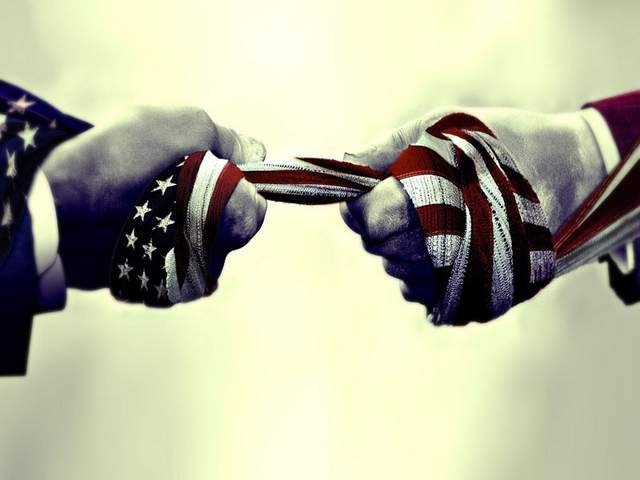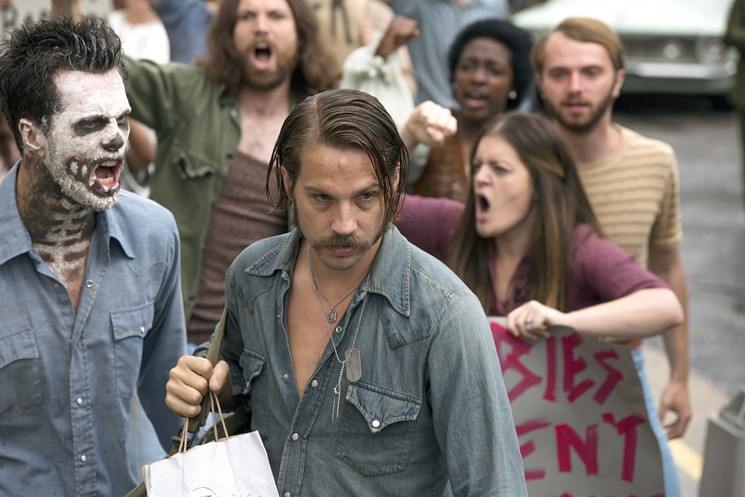by: Michael Shields ((Header photographs from the current California wildfires were taken by Josh Edelson.))
A foreboding piece of fiction that hits a little too close to home…
It happened fast. Before the local authorities or even the media were aware of it, squads of armed civilians swept into town. The units moved like soldiers, their instincts and actions garnered from the years when the vast majority of the insurgents were members of the Armed Forces. Once the pride of the nation, they now moved against it with fervor. Acting swiftly and decisively, and with the element of surprise entirely on their side, in hours, and with only minimal fatalities, they had secured all of the police departments throughout the city, Zones 1 through 6, as well all vital government agencies. The Pittsburgh Police Department was comprised of 2,100 employees. The insurgence consisted of more than twenty times that number in Pennsylvania alone. The Police never stood a chance. This was ground zero for the uprising. The National Guard would be moving in soon, exactly what the insurgents were counting on.
The group that had initiated the insurrection called themselves FAID, an acronym for Fundamental and Irreparable Differences. Their leader, Lance Stephenson, was formerly a part of a civil militant group known as The Freedom Guard, who in extreme circumstances of civil unrest assembled with local police in triumphant shows of force. The Freedom Guard were former and current members of the military, law enforcement and emergency responders who materialized in the thick of the nation’s most tense moments; periods of political, social, and racial unrest where violence was invoked in an effort to garner attention. During these moments the Freedom Guard would safeguard neighborhood apartments and watch over local businesses. Taking matters into their own hands, The Freedom Guard, with Lance as their most vocal and assertive member, acted as mediators and peacekeepers. They weren’t police, and never pretended to be. They were heavily-armed, highly trained, ex-military who acted as constables, taking shit from neither badge nor bandit.
But in time something changed within Lance. He began to feel that The Freedom Guard were all too often, and blindly, siding with local police departments. He found some of the decisions that they were making, in regard to whom and what they shielded, often racially or politically motivated. Lance wasn’t a racist, but he began to feel that racism had infiltrated The Freedom Guard’s ranks. He was a man of the people who refused to side with those who would riot or rebel violently, but advocated for those residents in downtrodden towns who were being maltreated or disregarded. It was his belief that the citizens of cities like Baltimore or Ferguson, or Pittsburgh in this most recent case, should arm themselves to combat the tyrannical police forces. And they should do it openly and without remorse. It was their right, he reminded them at rallys. Few, in a nation run rife with gun enthusiasts, were as staunch a supporter of the 2nd Amendment as Lance. It was this concept that guided all his actions, and the foundation he had built his church upon.
It was behind Lance’s initiative to involve community members in his crusade where FAID grew into a national power. Lance traveled the country relentlessly, rallying a frustrated populace to his cause. He went into inner cities and urged exploited communities to stand up for themselves. He implored the oppressed to no longer accept crime and violence in their community, nor to admit a hyper-militarized police force into their neighborhoods to oversee their every move. “It is time,” he proclaimed “to educate yourselves on the laws of this here land. To utilize your god-given right to bear arms, and to take back and secure your own city. Your own community.” But Lance went further than that; he showed the people how.
Volunteers came in droves. Thousands of members were initiated into FAID daily, and in time each new candidate was trained and armed. FAID was preparing for war, and its growth was occurring at a startling rate. But it wasn’t only FAID. Fiercely anti-government militaristic groups of all kinds were emerging in even the most remote of communities. Some were righteous, yearning to dampen the authority of an increasingly intrusive government. Others had more mischievous motives. They just wanted to stir the pot. And stir they did.
The city of Pittsburgh became a hotbed of activity a year prior to FAID’s first offensive. A team of police officers entered the section of town known as Homewood in the dark of night exceedingly armed and with nefarious intentions. One of their own had been assassinated while on patrol. Simply sitting in his car, a masked assailant crept up on the officer and unloaded a glock into him. The autopsy reported that twenty-three bullets had riddled the officer’s body that doleful evening, and a few members of the department took it upon themselves to avenge their fallen brother. They attacked without prejudice, and in the end thirteen citizens were murdered, all African-American, all innocent, and all simply in the wrong spot at the wrong time. This was the spark that lit the fuse. This was the moment Lance had anticipated. The moment he had prepared for.
Although the revolt happened quickly, the events leading directly to the insurrection unfolded over a long period of time. The writing had been on the wall for decades. The frustration of the middle and lower classes were palpable in the years leading up to the The Massacre in Hometown. Society’s distrust of the government had reached a fever pitch. Citizens were fed up with the ineptitude. With the National Security Agency. With the overly-militarized and unrestrained police forces and the deep-seated racial divide. They were fed up with corporate greed and its stranglehold on politicians. With GMOs and a consummate lack of concern about the well-being of the environment. They were even frustrated with the everyday nuisances such as credit cardholder’s agreements, soulless suburbs, a failing infrastructure, and celebrity worship. The corporate, consumer-based ideologies that increasingly bureaucratized and regulated their lives was not longer going to be tolerated. Something was poised to give.
Pittsburgh was just the beginning. FAID’s mobilization and capabilities were far beyond what the government could have anticipated, and with various anti-government factions seizing the moment to strike concurrently, the nation found itself in an all out war. A civil war had begun, and with the glut of participatory sects the aggregate effect of the various movements was a nation torn apart by its seams. A war being waged on countless fronts, with rivals sharing mutual enemies, and allies backing the opposite side of the same contest, conflicting interests abounded. The nation’s inevitable response was haphazard and savage. Drone warfare was deployed generously, and the body count was immense. Lance may have gotten the war he had always coveted, but the results were disastrous beyond even his imagination. There was no end in sight.
And all the while war and savagery reigned, out on the Western Coast the fires raged. Forests and neighborhoods were reduced to ash as thick acrid smoke spiraled violently into the air. Orange tongues of flames licked at the sky across millions of acres. A choking veil of darkness swallowed the sky as squalls of ash slowly drifted to the ground like charred, dirty snowflakes. It was a fire representative of the bloodshed engulfing the nation. Of the pain and the loss and the confusion that was born through so much negligence and greed. A fire that swallowed everything in its path without bias. A fire emblematic of the end of an empire.







